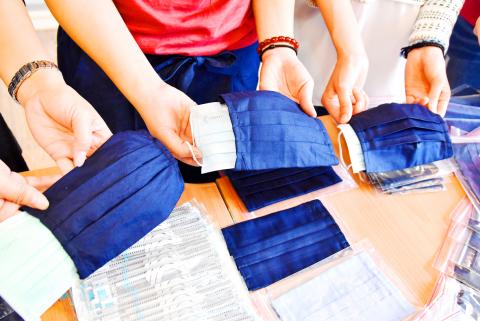People are making covers for masks to prolong their lifespan as lines to buy them have become an unwanted routine amid the COVID-19 pandemic.
Handmade cotton covers are becoming popular as people seek to resolve the problem of a supply shortage. The practice has prompted civic groups, schools and prisoners with sewing skills to make the accessories or give courses on how to make them with scraps of leftover cloth.
Students in the Department of Fashion Styling and Design at Yu Da University of Science and Technology in Miaoli County made mask covers for charity for elderly people who live alone in remote areas of the county.

Photo copied by Huang Shu-li, Taipei Times
There are no pharmacies linked to the National Health Insurance (NHI) system to sell rationed masks in some remote villages, so residents, many of whom are elderly, have to travel to other towns to buy them, Yu Da University president Leo Huang (黃榮鵬) said on Tuesday.
Some even have to ride a bicycle for more than 10km to buy just three masks, he said.
After hearing about the situation, teachers and students with sewing skills initiated the campaign, Huang said.
Due to high demand amid the pandemic, the government has been requisitioning masks produced in the country and rationing them after supplying hospitals and healthcare workers.
Under the rationing system, which began on Feb. 6, anyone can buy disposable surgical masks on Sundays at designated drugstores and pharmacies by presenting their NHI card, while on the other days of the week, sales are staggered based on the last digit of their national ID number. Purchases are limited to three masks every seven days.
Mask cover making has also been taken up by groups who care for underprivileged people, including in Taichung and Hsinchu County, and in prisons that offer sewing classes.
Minister of Justice Tsai Ching-hsiang (蔡清祥) on Feb. 26 said that several prisons are making covers.
This allow inmates to acquire sewing skills and also helps ease mask demand, Tsai said.
Taichung City Councilor Chiu Su-chen (邱素貞) said that sewing mask covers is not a challenge, as she is fond of needlework.
“Such covers can prolong a mask’s lifespan, but they have to be washed every day,” Chiu said.
Covers should be washed daily and masks used under them changed every two to three days, particularly when the weather is hot, medical experts said.
People should wear surgical masks without a cover in hospitals or places where the risk of virus transmission is high, such as crowded and confined spaces, they said.
Hospitals ask visitors to discard their masks after leaving, given the risk that the virus could spread through airborne droplets on them.
Taiwan Adventist Hospital physician Su Chih-sheng (蘇志盛) said mask covers are a “nice” alternative for people on public transport or those who are in a confined space for a short period, but they are definitely not for medical personnel and people who have symptoms.

A small number of Taiwanese this year lost their citizenship rights after traveling in China and obtaining a one-time Chinese passport to cross the border into Russia, a source said today. The people signed up through Chinese travel agencies for tours of neighboring Russia with companies claiming they could obtain Russian visas and fast-track border clearance, the source said on condition of anonymity. The travelers were actually issued one-time-use Chinese passports, they said. Taiwanese are prohibited from holding a Chinese passport or household registration. If found to have a Chinese ID, they may lose their resident status under Article 9-1

Taiwanese were praised for their composure after a video filmed by Taiwanese tourists capturing the moment a magnitude 7.5 earthquake struck Japan’s Aomori Prefecture went viral on social media. The video shows a hotel room shaking violently amid Monday’s quake, with objects falling to the ground. Two Taiwanese began filming with their mobile phones, while two others held the sides of a TV to prevent it from falling. When the shaking stopped, the pair calmly took down the TV and laid it flat on a tatami mat, the video shows. The video also captured the group talking about the safety of their companions bathing

PROBLEMATIC APP: Citing more than 1,000 fraud cases, the government is taking the app down for a year, but opposition voices are calling it censorship Chinese Nationalist Party (KMT) Chairwoman Cheng Li-wun (鄭麗文) yesterday decried a government plan to suspend access to Chinese social media platform Xiaohongshu (小紅書) for one year as censorship, while the Presidential Office backed the plan. The Ministry of the Interior on Thursday cited security risks and accusations that the Instagram-like app, known as Rednote in English, had figured in more than 1,700 fraud cases since last year. The company, which has about 3 million users in Taiwan, has not yet responded to requests for comment. “Many people online are already asking ‘How to climb over the firewall to access Xiaohongshu,’” Cheng posted on

A classified Pentagon-produced, multiyear assessment — the Overmatch brief — highlighted unreported Chinese capabilities to destroy US military assets and identified US supply chain choke points, painting a disturbing picture of waning US military might, a New York Times editorial published on Monday said. US Secretary of Defense Pete Hegseth’s comments in November last year that “we lose every time” in Pentagon-conducted war games pitting the US against China further highlighted the uncertainty about the US’ capability to intervene in the event of a Chinese invasion of Taiwan. “It shows the Pentagon’s overreliance on expensive, vulnerable weapons as adversaries field cheap, technologically